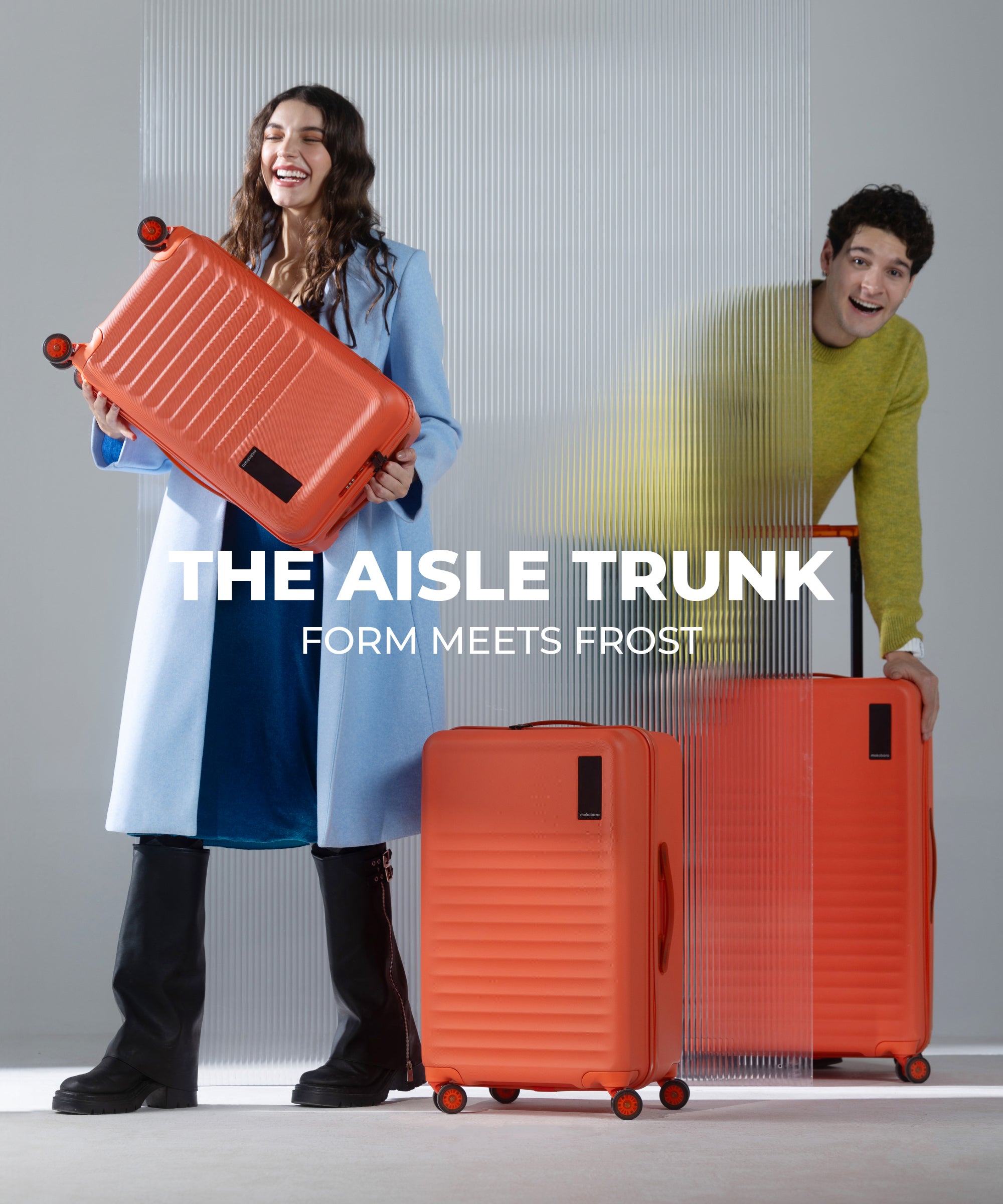TL;DR: Key Strategies to Avoid Baggage Fees
- Prepay baggage online to save 20-50% compared to airport rates.
- Use travel credit cards with free checked bag benefits for automatic savings.
- Pack strategically with lightweight luggage and multi-purpose items.
- Wear heavy items like boots and coats instead of packing them.
- Choose airlines wisely. Some include bags while others charge for everything.
- Ship luggage for extended trips when costs beat multiple bag fees.
Air travel costs keep climbing, and baggage fees have become one of the most frustrating expenses for travelers. Whether you're planning a quick weekend trip or an extended international journey, understanding how to avoid baggage fees can save you hundreds of dollars annually. Let's break down the most effective strategies to keep your travel budget intact while ensuring you have everything you need for your trip.
Understanding Airlines and Baggage Fees Landscape
Airlines generate billions in revenue from extra baggage charges for international flights and domestic routes. The fees have increased significantly over the past decade, making it crucial for smart travelers to understand the system and work around it.
Most airlines follow a tiered pricing structure where the first checked bag costs between $30-60 for domestic flights, while international routes can range from $50 to 150 depending on your destination. Additional bags often cost double or triple the first bag fee, making multiple checked bags extremely expensive.
How to Avoid Baggage Fees: Strategic Approaches
The key to beating baggage fees lies in planning ahead and understanding your options. Here are the most effective strategies that experienced travelers use to keep their money in their pockets.
Master Your Airline's Specific Policies
Every airline has different rules, weight limits, and size restrictions. Some allow larger carry-ons, while others are stricter about personal items. Research your specific airline's policies at least a week before travel.
Key areas to check:
- Carry-on size and weight limits
- Personal item dimensions
- Elite status benefits
- Credit card partnerships
- Advance booking discounts
Choose the Right Luggage for Your Travel Style
The luggage you select directly impacts your ability to avoid baggage fees. When you travel with properly sized, lightweight luggage, you maximize your packing capacity without exceeding weight limits.
Consider the Mokobara Transit Cabin Pro, designed specifically for carry-on compliance across most international airlines. Its hard shell construction protects your belongings while staying incredibly lightweight at just 3.46kg. The front compartment provides quick airport security access for laptops and documents, eliminating the need to check bags just for organization.
For longer trips requiring multiple bags, the Transit Wave Set of 3 offers a smart nesting solution. The bags fit inside each other for storage, and the various sizes give you flexibility to use only what you need for each trip. This approach lets you avoid extra baggage charges for international flights by right-sizing your luggage to your trip length.
Smart Packing Techniques to Avoid Baggage Fees
Efficient packing is your first line of defense against baggage fees. The goal is to maximize space while minimizing weight, allowing you to fit more into your carry-on allowance.
Weight Distribution Strategies
- Pack heavy items like shoes and books in your carry-on
- Use your personal item for dense, valuable electronics
- Wear your heaviest outfit and shoes while traveling
- Fill shoes with socks, chargers, and small items
Multi-Purpose Item Selection
Choose clothing and gear that serve multiple functions. A wrinkle-resistant blazer works for business meetings and dinner out. Comfortable walking shoes that look presentable eliminate the need for multiple pairs.
The 5-4-3-2-1 Packing Rule
- 5 sets of underwear and socks
- 4 tops that mix and match
- 3 bottoms (pants, shorts, or skirts)
- 2 pairs of shoes maximum
- 1 jacket or sweater
Compression and Organization Tools
Packing cubes and compression bags can increase your luggage capacity by 30-40%. They also keep items organized, making airport security checks faster and easier.
How Do I Avoid Paying Baggage Fees on Airlines: Advanced Tactics
Beyond basic packing strategies, several advanced techniques can help you circumvent baggage fees entirely.
Leverage Credit Card Benefits
Many travel credit cards include checked bag fee waivers as a primary benefit. Cards like the Chase Sapphire Preferred or American Express Gold can save you $60-120 per round-trip flight.
Top credit cards offering baggage fee benefits:
- Chase Sapphire Preferred: Primary cardmember + companion
- American Express Gold: Up to $100 statement credit annually
- Delta SkyMiles Cards: Free first checked bag on Delta flights
- United MileagePlus Cards: Free bags based on card tier
Strategic Flight Booking
Some airlines include checked bags in their fare structure. Southwest Airlines famously offers two free checked bags, while international carriers often include at least one bag on long-haul flights.
Budget airlines may seem cheaper upfront, but when you add baggage fees, meals, and seat selections, full-service carriers often provide better overall value.
Airport Shipping Services
For extended trips or when moving locations, shipping your luggage can be more economical than paying extra baggage charges for international flights. Services like ShipMyLuggage or SendMyBag offer door-to-door delivery at competitive rates.
Alternative Strategies When Baggage Fees Are Unavoidable
Sometimes you genuinely need more than carry-on space. In these situations, smart planning can still minimize costs.
Prepay Online vs Airport Fees
Airlines typically charge 20-50% more for baggage fees paid at the airport compared to online advance purchase. Always buy baggage allowances when booking or at least 24 hours before departure.
Weight Optimization at Check-In
If your bag is slightly overweight, consider these last-minute tactics:
- Move heavy items to your carry-on or personal item
- Wear extra layers if the weather is appropriate
- Ask if the airline offers a small weight buffer
- Check if upgrading to a higher fare class provides better baggage allowance
Split Between Travelers
When traveling with companions, distribute weight evenly across all checked bags rather than having one person's bag exceed limits while another's is under-packed.
Smart Luggage Investments That Pay Off
Quality luggage designed for airline travel can significantly reduce your baggage fees over time. Features like expandable compartments, lightweight materials, and precise sizing for airline requirements make a substantial difference.
The Mokobara Iconic Luggage Set of 2 exemplifies smart design for frequent travelers. The German polycarbonate construction provides durability without excess weight, while the internal compression system helps you pack more efficiently. The nesting feature means you can use just the cabin size for short trips and both pieces for extended travel, giving you flexibility to match your luggage to your trip needs.
For business travelers, the Transit Cabin Overnighter provides the perfect solution for short trips where a full cabin bag is too much but a backpack isn't professional enough. Its front tech compartment streamlines airport security, while the compact 44-liter capacity fits most 2-3 day business trips without requiring checked luggage.
International Travel and Baggage Fees
Extra baggage charges for international flights can be particularly steep, often reaching $200-400 for additional bags. International routes require extra planning due to longer trip durations and varying weather conditions.
Regional Considerations
Different regions have varying approaches to baggage policies:
Europe: Budget carriers like Ryanair and EasyJet charge for everything, including carry-ons above a small personal item. Full-service carriers typically include one checked bag on intercontinental routes.
Asia: Many Asian carriers are generous with baggage allowances, especially on long-haul routes. Check weight limits carefully, as some use piece systems while others use weight-based allowances.
Middle East: Gulf carriers often include generous baggage allowances as part of their premium service positioning.
Planning Your Next Trip Without Baggage Fees
Successfully avoiding baggage fees requires a combination of smart planning, the right equipment, and understanding airline policies. Start by researching your specific airline's rules, invest in properly sized luggage, and develop efficient packing techniques.
Remember that how to avoid baggage fees isn't just about saving money. It's about travel freedom. When you can fit everything in your carry-on, you avoid checked bag delays, reduce airport waiting times, and gain flexibility in your travel schedule.
The strategies outlined here can save experienced travelers thousands of dollars annually while making the entire travel experience smoother and more enjoyable. Whether you're planning a quick weekend getaway or an extended international adventure, these techniques will help you travel smarter, not harder.
Ready to transform your travel experience? Start by choosing luggage designed for modern airline travel, and watch how much easier and more affordable your journeys become. Your future self and your wallet will thank you for making the investment in smarter travel strategies today.
Frequently Asked Questions
Q1. How can I avoid paying for extra baggage on international flights?
Book with airlines that include baggage in their international fares, use travel credit cards with baggage benefits, pack strategically in carry-on and personal items, or consider shipping luggage for extended trips.
Q2. Does wearing heavy clothes help avoid baggage fees?
Yes, wearing your heaviest items (boots, coats, multiple layers) prevents them from adding weight to your luggage. However, be practical about comfort during travel and destination weather.
Q3. What's the cheapest way to pay for checked baggage when unavoidable?
Always prepay online rather than at the airport. Many airlines offer 20-50% discounts for advance baggage purchases compared to airport rates.
Q4. How do elite status and credit cards help with baggage fees?
Elite airline status typically includes free checked bags, priority boarding, and weight allowance increases. Travel credit cards often provide similar benefits and can fast-track you to elite status through spending bonuses.
Q5. Are there ways to get around carry-on size restrictions?
Stick to published size limits. Airlines are increasingly strict about enforcement. Instead, focus on lightweight, well-designed luggage that maximizes space within the allowed dimensions.
Q6. What happens if I get caught trying to sneak extra weight in my carry-on?
Airlines can force you to check oversized or overweight carry-ons at the gate, often at higher fees than if you had checked the bag initially. Gate agents have scales and size-checking tools, so attempting to bypass restrictions usually backfires with additional costs and travel delays.






Leave a comment
This site is protected by hCaptcha and the hCaptcha Privacy Policy and Terms of Service apply.